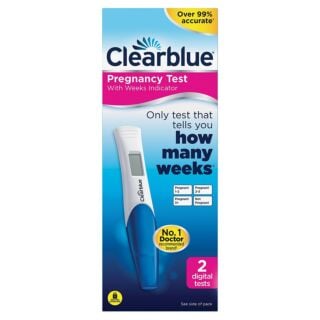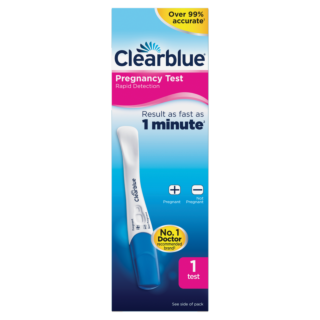What is the Best Clearblue Pregnancy Test for Me?
How to choose the perfect pregnancy test
You think this may be it, all the signs are there, you’ve done the deed (and maybe more than once for good luck), and you could be pregnant.
All that’s left to do is find out, it’s time to pick up a pregnancy test and pee on it, but which one do you choose? There are so many out there, but what do they do differently?
Let’s find out! Today we’re going to be looking at the range of Clearblue pregnancy tests and finding out which one is the best for you and what you need from your test.

The best digital pregnancy test
If you’re looking for a test that won’t confuse you when it’s time to read the results (what do all of those little lines mean anyway?) then you might want to pick up a digital pregnancy test.
Our favourite is the Clearblue Digital Pregnancy Test with Weeks Indicator, which shows your results in clear words on its digital screen.

Not only will this one show you your results as clear as day, it has the added bonus of being able to show you how long it’s been since you conceived.
This is the only pregnancy test that tells you how many weeks its been since you fell pregnant, and it could not be easier to read, saying the words “pregnant” or “not pregnant” on the screen followed by the number of weeks its been since you became pregnant.
If you’re looking for a test that will tell you it all at a glance, this is the one for you.
The best early pregnancy test
If you just can’t wait to find out whether or not you’re pregnant then you should consider taking an early results pregnancy test.
We love the Clearblue Digital Early Detection Pregnancy Test, which is a digital test that can tell you whether you’re pregnant up to 5 days before your missed period.

As this one is a digital test, it will tell you your pregnancy test results in clear words, so there’s no doubt when it’s time to read the test.
This test also features a handy countdown timer on the digital screen, which will let you know when the test is done and ready to read.
However, if you’re a fan of the more traditional tests and want to see the little lines show up in the box, the Clearblue Early Detection Pregnancy test is also available and it’s ideal for those who like their tests a little more old school.
This one can also be used up to 6 days before your missed period, so if you really can’t wait to find out, this is another great option for you.
The best pregnancy test for fast results
If waiting around for your test results isn’t your style, then we’ve got the perfect test for you.
The Clearblue Rapid Detection Pregnancy Test can give you your test results as quickly as just one minute!

This isn’t a digital pregnancy test, but the results are still really clear and easy to read, just look for a line or a cross in the little window.
And if you’re still not sure what you’re looking for, the results are printed right next to the window on the test itself, so you’ll have a little reminder right there.
This is the best choice for those of us who are a little impatient and can’t handle the typical 3-minute wait for those potentially world-changing results!
The best pregnancy test when you’re trying for a baby
If you’re trying to become pregnant and want to make the process as quick and easy as possible, you should consider the Clearblue Advanced Fertility Monitor.
Don’t be fooled by the name, this product is designed to let you know when you’re at your most fertile, but it can also be used to test for pregnancy too!

This handy touch screen monitor can help you to test for your most fertile days with the purple fertility testing sticks, so you can find out when you’re most likely to get pregnant if you have sex.
Once you’ve pinpointed your most fertile days and had a little fun trying to make a baby, use the blue pregnancy testing sticks to find out if it worked!
Your results will show up clearly on the monitor’s screen, so you’ll know without a doubt if your baby making efforts have worked, and if they haven’t then you’ll know when the best time is to try again!
The best pregnancy test for when you want to be absolutely sure
If you’re the kind of person who wants to be absolutely sure about their test results, then you might want to consider taking two tests so you can confirm your result.
If this sounds good to you, then the Clearblue Pregnancy Test Combo Pack is exactly what you need!

It contains one Clearblue Rapid Detection Pregnancy Test and one Clearblue Digital Pregnancy Test with Weeks Indicator, so you can get testing right away.
To begin with, use your Rapid Detection Test to find out whether you’re pregnant or not pregnant quickly and easily.
Then take your time and use the Digital Pregnancy Test to confirm your results and find out how many weeks it’s been since you conceived.
This testing kit will give you peace of mind when you need it most, so you can feel absolutely sure about these ever-so-important results.
The most accurate pregnancy tests
The best thing about Clearblue pregnancy tests is that they’re all over 99% accurate when used from the first day of your expected period.
So, no matter which pregnancy test you think is best for you, you’ll always get the most accurate results possible!
All that’s left to do now is weigh up your options and choose which of their pregnancy tests best suits your own personal needs.

Now we know all about the different types of Clearblue pregnancy tests and hopefully we’ve helped you to choose the very best test for you and your needs.
All you need to do now is get that test done! Go ahead, this could be the biggest day of your life!







